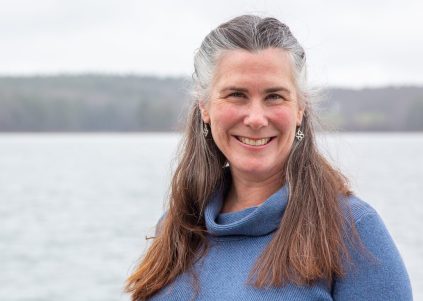Heather Leslie
Social Media:
Website: https://www.umaine.edu/leslie-lab/
Twitter: @hleslie_umaine
Media Expertise:
- Marine fisheries and aquaculture
- Coastal and marine science
- Climate
- Conservation planning and evaluation
- Coastal ecosystem health and community well–being
- Marine economy and workforce
Research Interests:
- Marine conservation science
- Coupled social-ecological systems
- Ecology
- Translating knowledge to action through engagement and science communication
Research Projects:
Resources:
- Mitchell Center News, April 2, 2019
IURC Funds Four Sustainability Projects - Mitchell Center News, Nov. 28, 2017
Clearer Waters for Ecosystem-based Fisheries Management - Workshop Report, Sept. 27 & 28, 2017
Integrating Ecosystem-Based Fisheries Management and Co-Management - Mitchell Center News, September 13, 2017
Integrating Ecosystem-Based Fisheries Management and Co-Management
Education:
- Ph.D., 2004, Oregon State University
- AB, 1996, Biology, Harvard University
Profile:
An international leader in marine conservation science, Heather Leslie conducts research on the ecology, policy, and management of coastal marine ecosystems. Heather is a professor of Marine Sciences in UMaine’s School of Marine Sciences.
She studies the drivers of ecological and social processes in marine systems, and how to more effectively connect science to policy and management. Specific research areas include coastal marine ecology; human-environment linkages, particularly those related to coastal areas; and the design and evaluation of marine management strategies. Leslie’s work has appeared in the Proceedings of the National Academy of Sciences, Ecology, Conservation Biology, and Frontiers in Ecology and the Environment.
A member of the University of Maine faculty since August 2015, Heather Leslie received an A.B. in Biology from Harvard University, a Ph.D. in Zoology from Oregon State University, and conducted postdoctoral research at Princeton University. Before arriving at UMaine, she was on the faculty at Brown University, as the inaugural Peggy and Henry D. Sharpe Assistant Professor. She is a Leopold Leadership Fellow and originally from Plymouth, Massachusetts. Heather lives by the Damariscotta River in Newcastle, Maine, with her two children and husband, microbial ecologist Jeremy Rich.
Selected Publications:
More publications can be found at https://umaine.edu/leslie-lab/publications/
Cucuzza, M., Stoll, J. S., & Leslie, H. M. (2020). Comprehensive plans as tools for enhancing coastal community resilience. Journal of Environmental Planning and Management, 63(11), 2022-2041.
Stoll, J. S., Leslie, H. M., Britsch, M. L., & Cleaver, C. M. (2019). Evaluating aquaculture as a diversification strategy for Maine’s commercial fishing sector in the face of change. Marine Policy, 107, 103583.
Pellowe, K. E.* and H. M. Leslie. 2019. Heterogeneity among clam harvesters in northwest Mexico shapes individual adaptive capacity. Ecology and Society 24(4):25. Leslie, H. M. 2018. Value of ecosystem-based management. Proceedings of the National Academy of Sciences. https://doi.org/10.1073/pnas.1802180115
Álvarez-Romero, J. G, M. Mills, V. M. Adams, G. G. Gurney, R. L. Pressey, R. Weeks, N. C. Ban, J. Cheok, T. E. Davies, J. C. Day, M A. Hamel, H. M. Leslie, and R. A. Magris. 2018. Research advances and gaps in marine planning: towards a global database in systematic conservation planning Biological Conservation, doi:10.1016/j.biocon.2018.06.027
Aburto-Oropeza, O. et al., including HML and many others. 2018. Harnessing cross-border resources to confront climate change. Environmental Science and Policy, https://doi.org/10.1016/j.envsci.2018.01.001
Pellowe, K. E. and H. M. Leslie. 2017. Seasonal variability shapes resilience of small-scale fisheries in Baja California Sur, Mexico. PLoS ONE 12(8):e0182200. https://doi.org/10.1371/journal.pone.0182200.
Leslie, H. M. Principles for Interdisciplinary Conservation. 2017. Chapter 6 in Levin, P. S. and M. R. Poe, eds. Conservation for the Anthropocene Ocean. Elsevier.
Hughes, A. R., J. H. Grabowski, H. M. Leslie, S. Schyphers, S. L. Williams. 2017. Inclusion of biodiversity in habitat restoration policy to facilitate ecosystem recovery. Conservation Letters, 10.1111/conl.12419
Menge, B. A., M. Bracken, J. Lubchenco, and H. M. Leslie. 2017. Alternative state? Experimentally-induced Fucus canopy persists 38 years in an Ascophyllum-dominated community. Ecosphere, doi: 10.1002/ecs2.1725.
Crosby, S. C., A. Angermeyer, J. M. Adler, M. D. Bertness, L. A. Deegan, N. Sibinga, and H. M. Leslie. 2016. Spartina alterniflora biomass allocation and temperature: implications for salt marsh persistence with sea-level rise. Estuaries and Coasts, doi:10.1007/s12237-016-0142-9.
Crosby, S. C., D. Sax., M. E. Palmer. H. S. Booth, L. A. Deegan, M. D. Bertness, and H. M Leslie. 2016. Salt marsh persistence is threatened by predicted sea level rise. Estuarine Coastal and Shelf Science 181:93-99.
Baker, H.K., J. A. Nelson, H. M. Leslie. 2016. Quantifying striped bass (Morone saxatilis) dependence on salt marsh derived productivity used stable isotope analysis. Estuaries and Coasts, online 4.5.16.
Aburto, O., H. M. Leslie, A. Mack-Crane, S. Nagavarapu, S. M.W. Reddy, and L. Sievanen. 2016. Property rights for fishing cooperatives: how (and how well) do they work? World Bank Economic Review, published online 3.16.

